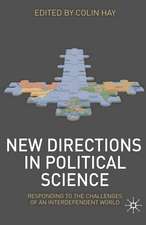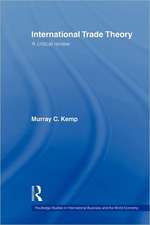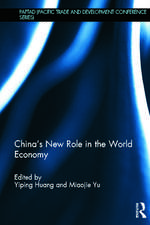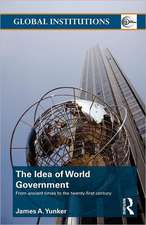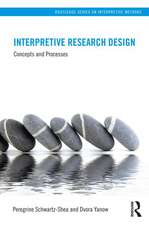Global Political Economy in the Information Age: Power and Inequality
Autor Gillian Youngsen Limba Engleză Paperback – 14 dec 2006
| Toate formatele și edițiile | Preț | Express |
|---|---|---|
| Paperback (1) | 413.13 lei 6-8 săpt. | |
| Taylor & Francis – 14 dec 2006 | 413.13 lei 6-8 săpt. | |
| Hardback (1) | 890.56 lei 6-8 săpt. | |
| Taylor & Francis – 21 dec 2006 | 890.56 lei 6-8 săpt. |
Preț: 413.13 lei
Nou
Puncte Express: 620
Preț estimativ în valută:
79.06€ • 82.24$ • 65.27£
79.06€ • 82.24$ • 65.27£
Carte tipărită la comandă
Livrare economică 14-28 aprilie
Preluare comenzi: 021 569.72.76
Specificații
ISBN-13: 9780415384070
ISBN-10: 0415384079
Pagini: 204
Dimensiuni: 156 x 234 x 13 mm
Greutate: 0.38 kg
Ediția:1
Editura: Taylor & Francis
Colecția Routledge
Locul publicării:Oxford, United Kingdom
ISBN-10: 0415384079
Pagini: 204
Dimensiuni: 156 x 234 x 13 mm
Greutate: 0.38 kg
Ediția:1
Editura: Taylor & Francis
Colecția Routledge
Locul publicării:Oxford, United Kingdom
Cuprins
Introduction: 20th-21st Century Imaginings and Realities Section 1: Time/Space Frameworks 1. States and Markets: Understanding Geospatial Time 2. Virtual Realities: Exploring Sociospatiality 3. The Political Economy of Time: Historical Time, Speed and Mobility Section 2: Borders and Inequality 4. Transcendence and Communication 5. Inequality as Driver 6. Embedding Patriarchy: Feminism and Inequality in the Internet Era Section 3: Technofutures and Power 7. Complex Hegemony in the 21st Century: Power and Inequality Conclusion
Notă biografică
This volume is an insightful, fresh and broad-ranging evaluation of the conceptual challenges of globalization and the new information era.
We are living in an unparalleled era of globalization; a world of Internet connectivity and emerging markets in which borders are becoming ever more permeable and trade increasingly global. From technology and change to knowledge and power, this book examines how established theoretical traditions of international relations and global political economy are shifting in the information age. Written from a critical perspective, it analyzes how information and technology are becoming of greater structural relevance to our understanding of globalization. By addressing the linkages between these two together with current socio-economic developments, Gillian Youngs argues that technology is one of the key ways in which we can study how power is attained and maintained in global political economy. This volume is divided into three sections:
We are living in an unparalleled era of globalization; a world of Internet connectivity and emerging markets in which borders are becoming ever more permeable and trade increasingly global. From technology and change to knowledge and power, this book examines how established theoretical traditions of international relations and global political economy are shifting in the information age. Written from a critical perspective, it analyzes how information and technology are becoming of greater structural relevance to our understanding of globalization. By addressing the linkages between these two together with current socio-economic developments, Gillian Youngs argues that technology is one of the key ways in which we can study how power is attained and maintained in global political economy. This volume is divided into three sections:
- time/space frameworks
- borders and inequality
- technofutures and power.
Recenzii
Youngs is the Susan Strange for the new century. Craig N. Murphy, Wellesley College, USA
Youngs merges expertise in media, communications and global political economy to produce one of the most informed, insightful and accessible accounts to date of power and inequality in the Information Age. With a wealth of knowledge and a gentle hand, Youngs puts us on alert, spurs critical thinking, and points us forward. This fresh, engaging account deserves the widest possible audience. Spike Peterson, University of Arizona, USA
In this original and timely contribution, Gillian Youngs offers new insights into the increasingly complex, mediated sphere of the global political economy. In the process she challenges us rethink the nature and forms of contemporary global power and inequalities. John Tomlinson, Nottingham Trent University, UK
"Youngs’s book is immensely ambitious, covering huge areas in order to embed a discussion of technology within major economic and political shifts in international relations. In her discussions she goes to the heart of ongoing tensions within the technological determinism of our modern information society, deconstructing the human-technology interface (with some discussion of genetics and nanotechnologies [45]). In looking at power and inequality, she brings together a diverse set of literature, from feminist critiques of the economy, gender and development, and science and technology to transnational debates on United Nations’ indexes, poverty, and welfare." - Wendy Harcourt, Signs: Journal of Women in Culture and Society (Autumn 2008)
Youngs merges expertise in media, communications and global political economy to produce one of the most informed, insightful and accessible accounts to date of power and inequality in the Information Age. With a wealth of knowledge and a gentle hand, Youngs puts us on alert, spurs critical thinking, and points us forward. This fresh, engaging account deserves the widest possible audience. Spike Peterson, University of Arizona, USA
In this original and timely contribution, Gillian Youngs offers new insights into the increasingly complex, mediated sphere of the global political economy. In the process she challenges us rethink the nature and forms of contemporary global power and inequalities. John Tomlinson, Nottingham Trent University, UK
"Youngs’s book is immensely ambitious, covering huge areas in order to embed a discussion of technology within major economic and political shifts in international relations. In her discussions she goes to the heart of ongoing tensions within the technological determinism of our modern information society, deconstructing the human-technology interface (with some discussion of genetics and nanotechnologies [45]). In looking at power and inequality, she brings together a diverse set of literature, from feminist critiques of the economy, gender and development, and science and technology to transnational debates on United Nations’ indexes, poverty, and welfare." - Wendy Harcourt, Signs: Journal of Women in Culture and Society (Autumn 2008)
Descriere
This volume is an insightful, fresh and wide ranging evaluation of the conceptual challenges of globalization and the new information era.






